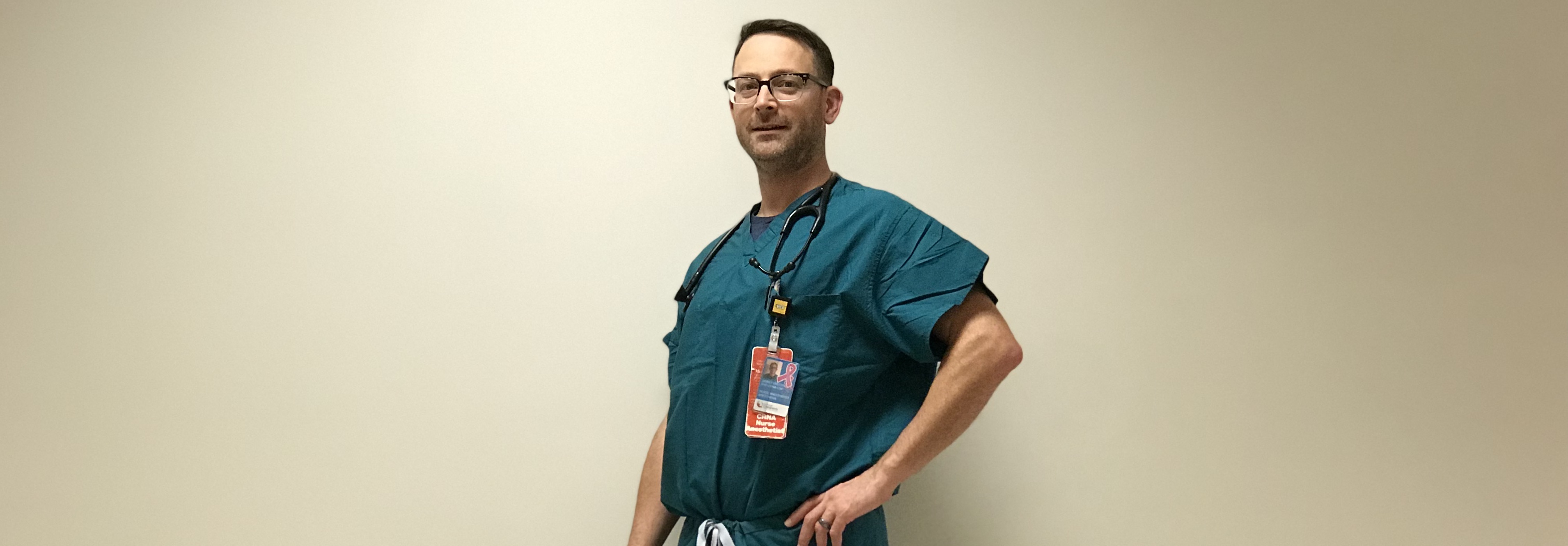Pursuing the DNAP and getting the best education at a school ‘revered’ for health education
Over the years, Jamie Furstein has seen each of his five children taken to the operating room – each undergoing a level of anesthesia. For some parents, having their child undergo anesthesia can be more stressful than the actual surgery.
But he’s seen it from both sides.
As a nurse anesthetist specializing in pediatrics, Furstein knows that he usually has only minutes with parents, often right before their child is scheduled to be transported to the surgical suite. As a parent, he understands what other parents want to know and how he can best explain his role in ways that allay their fears.
“You get a very limited time with parents before surgery. You have a very small window in which to get their trust,” said Furstein, associate CRNA director at Cincinnati Children’s Hospital Medical Center. “I take a lot of pride in explaining how I will treat their child and provide safe passage through that journey, helping to make it pain-free, nausea-free and the best possible outcome.”
He didn’t actually plan a career in pediatrics. While studying for his undergraduate nursing degree at the University of Cincinnati, he had a rotation on the pediatrics wing, and the team offered him a job after graduation.
But one of the long-term anesthesiologists at the hospital wasn’t convinced that working as a floor nurse would keep Jamie happy for a long career. The anesthesiologist recognized that Jamie is the type of person who needs to continue learning and solving challenges, prompting him to explore nurse anesthesia as the next stage.
Furstein went back to the University of Cincinnati to add master’s credentials in nurse anesthesia in 2004. Before too long, he was convinced to go for his DNAP, and he had only one place in mind: VCU and its top-ranked nurse anesthesia program.
“It was always in the back of my mind,” said Furstein, who earned his DNAP through VCU’s distance learning program, which allowed him to balance an ongoing patient load with advanced education – and his family duties. “You get the best of both worlds at VCU – everything the program has to offer without uprooting your family and moving halfway across the world. I wanted the best clinical experience and clinical education to improve myself and inspire others to move forward. The school is so respected and revered in health care.”
To Furstein, VCU offered a well-designed curriculum, while also encouraging graduate students to build leadership skills to advance their practice and influence those around them. His immersion in the DNAP program only whetted his appetite for more education. Almost immediately after graduating in 2011, he rolled into VCU’s Ph.D. nurse anesthesia program. Already armed with the best training to be a leader in surgical practice, Furstein wanted to get the tools to develop new science in the field. He earned his doctorate in 2016.
“Practice and research are two divergent areas, but they work well together and complement each other,” said Furstein, who teaches nurse anesthesia as part of the University of Cincinnati nursing faculty.
Today, Furstein’s research is rethinking pediatric anesthesia. He is looking at how to best leverage regional anesthesia, using ultrasound to guide a needle to deliver nerve-blocking medications. The upside is a reduced need for narcotics and their greater risks of nausea and even post-surgical addiction. Nerve blocks allow for quicker patient mobility and nutrition, which drive the best post-surgery recovery.
As he has advanced in both the operating room and at the research bench, Furstein recognized that his nurse anesthesia career has fostered his quest for continued growth.
“I like the autonomy, the critical thinking aspect of nurse anesthesia,” he said. “There’s a good variety in both the patient type and work cases.”
